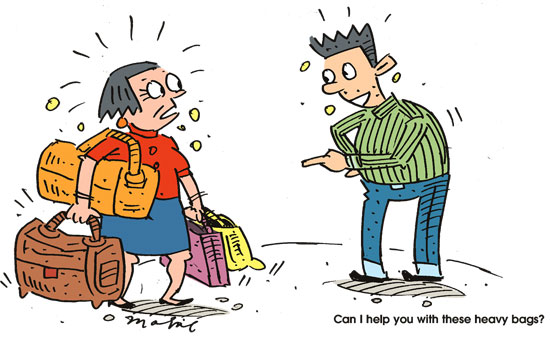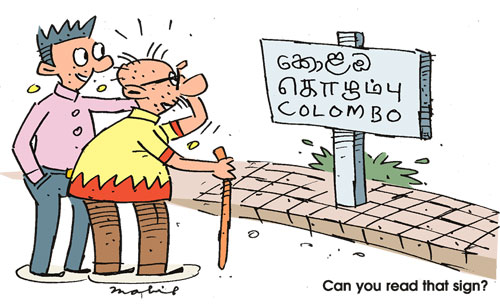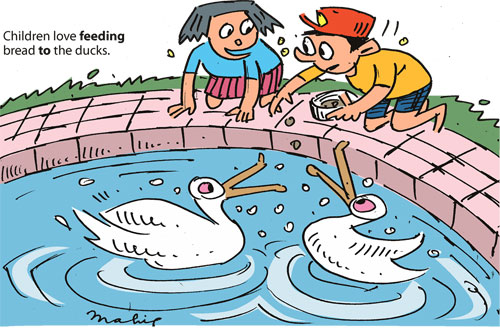|

by R. S. Karunaratne
Starters:
The difference between ‘can’ and ‘could’
‘Can’ is a modal verb meaning ‘able to do.’
Amanda can speak English.

Can you read that sign?
The doctor is doing all that he can.
If you don’t understand what the speaker says, leave the auditorium.
Can you type this letter?
‘Can’ is used to ask for permission.
Can I use your computer, John?
You can wait here until mother comes.
Can I sit here?
Can I borrow your bicycle?
She can come to the class now.
‘Can’ is used to make a request.
Can you tell Brenda that I’m leaving for Jaffna tonight?
Can you make a little less noise, please?
Can you post this letter?
Can you return my book tomorrow?
Can you do me a favour?
‘Can’ is used to express possibility.
You can buy stamps at the communication centre.
Can we learn French in two years?
Smoking can cause lung cancer.
Rosy can be quite annoying at times.
Don’t drink polluted water; you can get bowel diseases.
‘Can’ is used in polite offers.
Can I help you with these heavy bags?
Can I give you a lift?
Can I be of any help to you?
Can I wash your clothes as you are ill?
Can I do the shopping for you?
The negative of ‘can’ is ‘cannot’ or ‘can’t.’
Grandfather can’t read without glasses.
Can’t you come with me?
I can’t wait here any longer.
If you can’t give me Rs 500, I’ll go away.
You can’t have everything in life.
‘Can’ is used in standard spoken English in various situations.

“Could’ is slightly more formal than ‘can.’ However, ‘can’ and
‘could’ are acceptable in written English.
‘Could’ is the past tense of ‘can.’
When I was young I could sing well.
Mary said she could wait for me.
I asked him whether he could give me Rs 5,000.
Anoma said she could help me.
‘Could’ is used to ask for permission.
Could I speak to Gwen?
Excuse me, could you tell me who you are?
‘Could’ is used to make a request.
Could you turn the music down a little, please?
Could you lend me Rs 10,000?
‘Could’ is used to express possibility.
A lot of crime could be prevented.
Father could return home any time.
‘Could’ is used to make a suggestion.
Could we go for a walk?
You could always call me.
The negative of ‘could’ is ‘could not’ or ‘couldn’t.’
Sorry, I couldn’t call you yesterday.
Match words and meanings
Here’s a novel way to enrich your vocabulary. We give you 25 words in
Column ‘A’ and their meanings in Column ‘B.’ Match them and check your
answers with the key. The first one has been done for you.
[Column A]
M 1. bespeak
... 2. bespectacled
... 3. bestial
... 4. bestow
... 5. bestride
... 6. betoken
... 7. betting
... 8. bevelled
... 9. beverage
... 10. bevy
... 11. bewail
... 12. bewigged
... 13. bewilder
... 14. bewitch
... 15. beyond
... 16. biannual
... 17. bibliophile
... 18. bicentenary
... 19. biceps
... 20. bicker
... 21. bier
... 22. biff
... 23. bifurcate
... 24. bigwig
... 25. bikini
[Column B]
A. to give something as an honour or present
B. a drink of any type
C. a large group of women
D. to sit or stand with a leg on either side of an object or animal
E. happening twice a year
F. to attract somebody a lot
G. a person who loves or collects books
H. further away in the distance
I. to confuse somebody
J. wearing a wig
K. to be a sign of something
L. cruel
M. to suggest or show
N. having a sloping edge or surface
O. to express great sadness about something
P. to argue about unimportant things
Q. to hit somebody with the fist
R. a two-piece swimming costume for women
S. an important person
T. to divide into two parts
U. a frame on which a coffin is carried
V. the 200th anniversary
W. the large muscle at the front of the upper arm
X. the habit of risking money on horse races
Y. wearing glasses
Key:
2. Y 3. L 4. A 5. D 6. K 7. X 8. N 9. B 10. C 11. O 12. J 13. I 14. F
15. H 16. E 17. G 18. V 19. W 20. P 21. U 22. Q 23. T 24. S 25. R
The use of ‘to’ and ‘for’
Most beginners find it difficult to use the prepositions ‘to’ and
‘for’ correctly. If you learn the rules and the usage, you will be able
to use them in the right way.
General rule:

We give something to someone.
We buy something for someone.
The preposition ‘to’ is used with a number of verbs.
Bring the file to my office.
Children love feeding bread to the ducks.
Give it to me.
I handed the cheque to the bank manager.
I can lend a few books to you.
Visitors are not allowed to offer any food to the animals.
I owe my success to my education.
George passed the note to me.
The minister paid a tribute to the retiring principal.
Could you post the details to me?
He promised to meet me at the station.
Children love to have stories read to them.
I sold my old car to Jayantha.
The principal sent a message to the boy's father.
You should show that rash to your doctor.
Take me back to the third floor.
She teaches English to foreign students.
She hasn't written to me recently.
He read the news item to me.
The preposition ‘for’ is used with certain verbs.
The manager found a spare ticket for me.
I've reserved a seat for you.
Mother is making a cake for me.
Father has booked two tickets for us.
The police arrested several suspects for questioning.
Most parents want to build a better future for their children.
Father bought some flowers for his mother.
I've chosen a present for her.
She cooked an enormous meal for us.
Could you fetch my glasses for me?
I'll find a job for you.
I managed to get three shirts for Rs 1,000.
Ram is leaving for Australia.
Mary is making some coffee for you.
I'll order a drink for you.
You've been picked for the job.
This table is reserved for a group of foreigners.
I'm saving for a new car.
Fill in the blanks with ‘to’ or ‘for.’ Check your answers with the
key.
1. Give this file ......... my secretary.
2. Could you make some tea ........ us?
3. Book a flight .......... me.
4. Can you post this letter ...... the Law College?
5. Don't show this note .......... anyone.
6. If I'm not in, leave a message ........... me.
7. Bring that dictionary ...... me.
8. Please prepare a memo .......... all the managers.
9. I'll feed fish .......... the cat.
10.Emma sent an urgent message ......... her boss.
Key:
1.to 2. for 3. for 4. to 5. to 6. for 7. to 8. for 9. to 10. to
Form adverbs from nouns
Words often come in families. You can expand your vocabulary by
becoming familiar with these word families. We give you 25 nouns in
column ‘A.’ Write the relevant adverbs in Column ‘B’ and check your
answers with the key.
[Column A] [Column B]
1. ice ..............
2. imagination ..............
3. importance ..............
4. impression .............
5. increase ..............
6. independence .............
7. industry ............
8. infection .............
9. innocence ............
10.insistence .............
11.instance .............
12.instruction ............
13.intelligence .............
14.intention .............
15.interest .............
16.invention .............
17.invitation ............
18.joke .............
19.keenness .............
20.kindness .............
21.knowledge .............
22.laughter .............
23.law .............
24.laziness .............
25.legality .............
Key:
1.icily 2. imaginatively 3. importantly 4. impressively 5.
increasingly 6. independently 7. industrially 8. infectiously 9.
innocently 10. insistently 11. instantly 12. instructively 13.
intelligently 14. intentionally 15. interestingly 16. inventively 17.
invitingly 18. jokingly 19. keenly 20. kindly 21. knowingly 22.
laughably 23. lawfully 24. lazily 25. legally |

